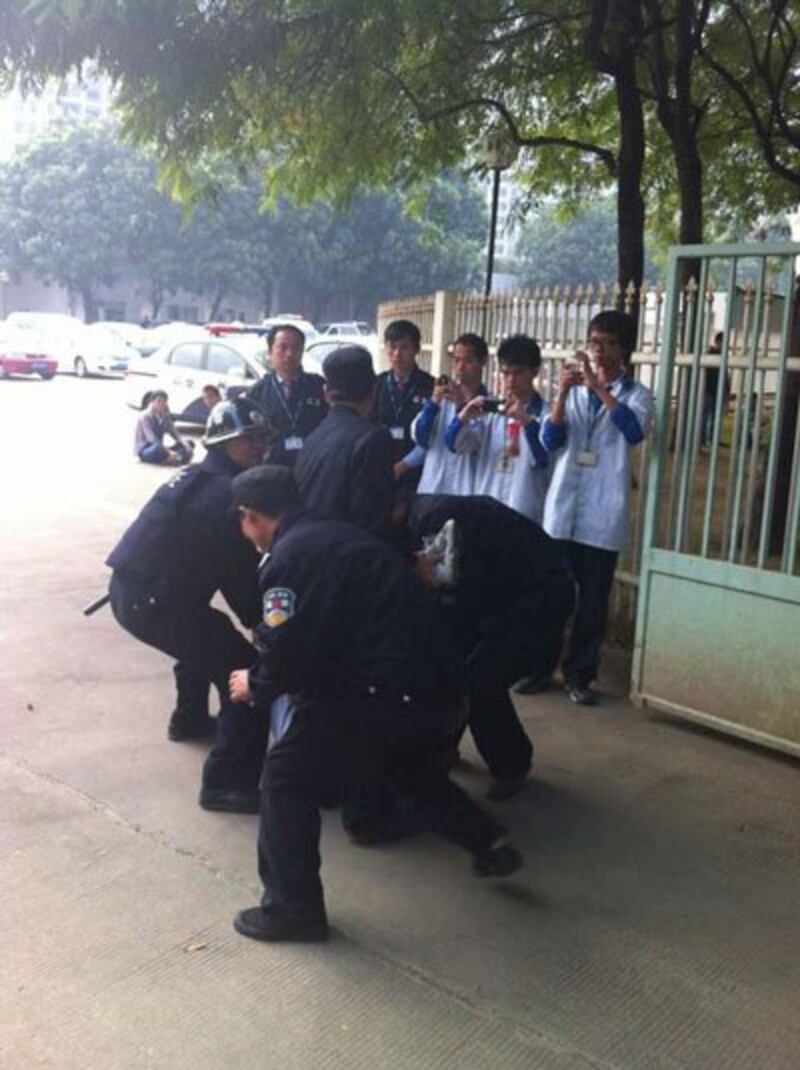Authorities in the southern Chinese province of Guangdong on Wednesday detained at least 10 people following clashes between police and striking workers at a Nokia factory in Dongguan during which six people were injured, workers said.
Hundreds of striking workers carrying banners which read "Workers are not goods," and "Compensation before deal-breaking!" clashed with police as the strike over new contracts entered its second day.
Photos of the strike posted online showed workers in white overalls with banners, surrounded by police in full riot dress and their vehicles.
"We lay down in the road and blocked vehicles from leaving, until a driver got down and told us he would drive over us," a striking worker surnamed Hu said on Wednesday.
"The factory management said they could afford the compensation if we were crushed to death, and the workers got very angry at this," he said.
"Then they sent in the armed police to beat people up, and the workers surrounded their vehicles, so the police took some of us sitting in the front row away and beat them up."
He said a pregnant woman was among the injured. "She was taken to hospital," he said. "Others had slight injuries, while others were dragged away by the armed police and locked up. They haven't been released yet."
"They took away more than 10 people, including the ones holding up banners, directing the crowd and leading the slogans," Hu added.
Workers said the crowd swelled to more than 1,000 people at its height.
"There were nearly 1,500 people there," a worker who gave the nickname Xiao Li said. "They wanted the boss to get out of his car and give us an explanation, but he wouldn't leave his car."
"Five minutes later, the riot police arrived with batons and weapons like that ...They pinned people to the ground and beat them up," Xiao Li said.

Workers dismissed
Meanwhile, Hu said the factory had retaliated by firing those who played a prominent role in the strike.
"We stopped work to fight for our rights," he said, adding that the factory had already fired at least 10 striking workers.
"They made them go through dismissal procedures at 11:00 p.m., midnight."
Hu said that the factory management had declined to hold talks with the workers.
"Every time they come out, they just name some people who have been fired," he said.
A post on the Twitter-like service Sina Weibo said workers were angry that newly hired workers were being paid more than those with seniority.
"How is this fair treatment?" said one tweet by user @A069.
An employee who answered the general switchboard at the factory declined to comment, and refused to connect the call to someone in charge.
"All the people in charge are very busy, so if you could give me a message, I will pass it on for you," the employee said.
Mobile division sale
Built in 1995, Nokia's Dongguan factory expanded its handset manufacturing capacity in 2006. Local media said the moved had created more than 7,300 jobs, giving the Dongguan factory a key role in the group's handset business.
Nokia shareholders on Tuesday approved the sale of the group's mobile phone division to Microsoft.
Nokia's chairman, Risto Siilasmaa said the decision was made to avoid "great difficulties" for the company.
"On the board of directors we understood that, as the decision-makers, we would also be heavily criticized," Siilasmaa said.
"However, we are convinced that continuing with the old strategy would have most likely led to great difficulties for Nokia, its shareholders and employees," he told reporters.
It was unclear whether there was a direct link between the Dongguan industrial action and the group's decision, however.
Reported by Yang Fan for RFA's Mandarin Service, and by Wen Yuqing for the Cantonese Service. Translated and written in English by Luisetta Mudie.
